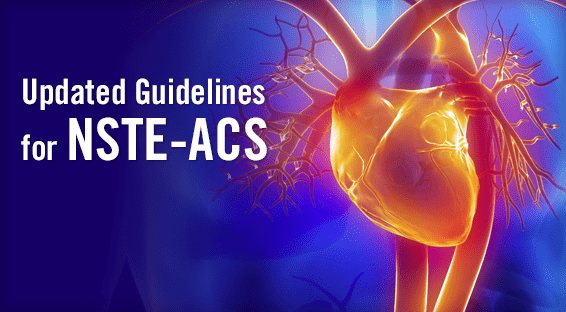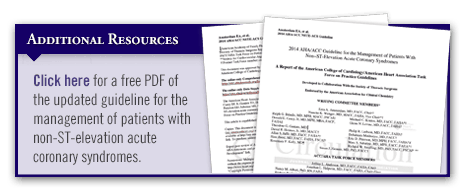Recently, the American College of Cardiology and American Heart Association (ACC/AHA) updated their guideline on the management of patients with non-ST-elevation acute coronary syndrome (NSTE-ACS). “This guideline is the first full revision of previous recommendations since 2007,” says Ezra A. Amsterdam, MD, FACC, who co-chaired the ACC/AHA writing committee. The other co-chair was Nanette Wenger, MD, of Emory University, and the writing group included 18 clinicians from multiple specialties involved in the care of patients with NSTE-ACS.
“The ACC/AHA update offers a new name and terminology that reflects current ways of thinking about the condition,” says Dr. Amsterdam. “The terminology now emphasizes the pathophysiologic continuum of unstable angina and NSTEMI and their frequently indistinguishable clinical presentations.” The update incorporates both established and new evidence from published clinical trials and information from basic science and comprehensive review articles. Dr. Amsterdam notes that there have been major advances since 2007 with regard to enhancing the care of these patients. Although still extensive and comprehensive, the document is now more direct and succinct.
Important Changes
“A significant change in the guideline was to replace the term ‘initial conservative management’ with ‘ischemia-guided strategy,’” says Dr. Amsterdam. “This was done to more clearly convey the physiologic rationale of this approach.” When treating NSTE-ACS, the guideline notes that an early invasive strategy for those with high-risk coronary artery disease has been successful. However, low-risk patients can benefit substantially from guideline-directed medical therapy (GDMT), an approach that has not always been optimally used.
Advances in cardiac troponin testing should help clinicians detect patients with NSTE-ACS, according to Dr. Amsterdam. “Advances in non-invasive assessment of prognostic risk may help distinguish if patients should receive invasive therapy or GDMT,” he says. “The guideline also offers recommendations on management of specific medications, such as triple therapy for stroke prophylaxis, in NSTE-ACS patients who require dual antiplatelet therapy and anticoagulation for atrial fibrillation.” In addition, the ACC/ AHA guidelines recommend developing a plan of care in the post-hospital phase, including information on patient education about symptoms, risk modification, medications, secondary prevention, referral to cardiac rehabilitation, and other GDMT.
Future Research
The guideline writing group reported that several important clinical areas require further investigation. “We need research on the appropriate application of new, high-sensitivity troponins that should be available soon,” Dr. Amsterdam says. “These are much more sensitive than current troponins, and we’ll need to determine how best to use and interpret this new source. We also need more studies on the utility of triple therapy with antithrombotic and anticoagulant drugs and on the proper selection of high-risk elderly patients and women for interventional therapy.”




 TimH
TimH